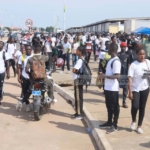
Early on the morning of Wednesday, November 12, the grounds of the El‑Wak Sports Stadium in Accra became the scene of a devastating disaster.
A crush of hopeful young applicants attending the recruitment exercise of the Ghana Armed Forces (GAF) erupted into a stampede. According to official confirmation, six people lost their lives, and many others were seriously injured and rushed to the 37 Military Hospital.
At roughly the same time, but weeks earlier, a seemingly remote tragedy unfolded on the waters of the Lake Volta: near Kete Krachi in the Oti Region, a small passenger boat capsized, killing 15 people, including 11 children aged between 2 and 14.
Two distinct tragedies, two different settings, yet a common thread: in both instances, young Ghanaians seeking opportunity, development, and a better future found instead the fatal consequences of systemic neglect, inadequate planning, and a national safety culture that remains too reactive rather than proactive.
The El-Wak Stampede: A Wake-up Call
At El-Wak, thousands of applicants descended on the recruitment venue in hopes of joining the GAF. Preliminary reports show the crush was triggered when a surge of applicants forced entry through a partially-opened gate at around 06:20 am.
The GAF expressed deep regret, indicated investigations are underway, and confirmed the death toll remains six, rejecting earlier media reports of up to 12 fatalities.
This incident is more than a tragic logistics failure. It highlights:
Overcrowding and insufficient crowd-control measures at an event expected to attract large numbers;
Inadequate pre-event risk assessment and planning, especially given the high youth-unemployment context that ensured heavy turnout;
Poorly managed entry protocols (only one gate open) and lack of adequate marshals or emergency response systems;
A systemic gap in safety culture: while the military organises large-scale recruitment, the question must be asked, why was risk management not built into the exercise?
The Lake Volta Boat Disaster: The Forgotten Faces
On October 11 2025, mourners returning from a funeral in Okuma to Bovime on Lake Volta boarded a small canoe far beyond its safe capacity. Winds and currents, and the lack of life-jackets, supervised loading, or competent operator training, led to the vessel capsizing. Four adults survived; fifteen lives were lost, eleven of them children.
The tragedy follows a familiar pattern in Ghana’s inland water transport: overloading, lack of life jackets, weak enforcement, and communities left vulnerable. An observer described it as:
“A catalogue of needless deaths. A pattern of preventable grief. A national failure repeating itself.”
Here we see again the absence of a safety-first culture, not only in major recruitment events but in everyday transport that millions rely on.
What Links These Two Disasters?
Both involve young people: job-seekers at El-Wak, children and youths on Lake Volta.
Both involved institutions or systems (the military recruitment centre and water transport / maritime regulation) carry a responsibility to design safe processes.
Both reflect preventable risks that are not treated as such. A stampede can be managed through the use of gates, marshals, proper scheduling, and safe design. A boat capsizing can be prevented through appropriate load control, the use of life jackets, operator training, and effective oversight.
Both expose a deficit in national safety mindset and culture: we respond after tragedy, not plan to prevent it. We mourn after loss, not act before lives are lost.
Why This Matters
For a country like Ghana, with a youthful population and significant youth unemployment, large-scale recruitment exercises are a ticket to hope, and water transport remains essential for many communities. Yet, when systems fail these fundamental services, the message to young Ghanaian citizens is harsh: your safety is not a priority.
For organisations like the MISORNU Safety Center, whose mission is to educate and empower people for safety awareness, these tragedies underscore the urgency of instilling a safety-first mindset across society’s schools, communities, institutions, transportation, and national events.
What Must Change
Mandated Risk Assessments for all major public events (e.g., recruitment drives, mass gatherings) and transport operations (ferries, inland boats).
Ensure Capacity and Crowd Control: at events like El-Wak, provide multiple entry points, triage zones, marshals, emergency response plans, and coordination with health services.
Enforce Water-Safety Regulations: For Lake Volta, enforce passenger limits, require life jackets for every passenger, certify boat operators, inspect vessels, and deploy a rescue response capacity.
Institutionalise Safety Education & Culture: from schools to assemblies; children, youth, and adults must recognise safety as a right, not a privilege.
Accountability and Follow-up: Investigation boards should publish their findings, enforce sanctions where negligence is proven, and contribute to system reform. Smokescreens and “maybe later” investigations are not enough.
Collaborative Approach: The government, regulators (e.g., the Ghana Maritime Authority), civil society, communities, and youth organisations must partner to embed safety-first practices.
A Word to the Youth – Your Safety Is in Your Hands Too
While institutions bear the responsibility to plan and protect, every young person must also cultivate personal safety awareness. Your life is precious. No opportunity—no exam, job, or event—is worth risking injury or death.
Be Alert in Crowded Areas: Stay aware of your surroundings. If pushing or shouting begins, move calmly away from the source.
Keep Calm, Don’t Rush: Panic kills faster than danger. If you can’t move, stay steady, breathe, and protect your chest.
Know When to Step Back: If a situation looks unsafe or overcrowded, leave and return later. There will always be another chance.
Move With Purpose, Not Fear: Arrive early, plan your movements, and follow instructions.
Look Out for One Another: Safety grows stronger when we care for others. Help those around you, and report unsafe conditions.
Safety begins with awareness—choose preparation over panic and responsibility over risk.
A Call to Action
To the families who lost beloved ones in both disasters—our deepest condolences. To the youth who arrived at El-Wak brimming with hope, and to the children on Lake Volta whose journeys ended in tragedy: your lives must not be in vain.
Ghana must honour your memory by transforming grief into resolve, prevention in place of reaction, and building a culture where safety is non-negotiable.
We must ask ourselves: Where is our safety-first mindset and culture? Until we answer that by action, we will continue to bury children, hoping the next tragedy does not happen on our watch. Until we answer that question with action, we will continue to lose the future we hope to build. Let this be the moment when prevention, not reaction, defines our national conscience.
Let this be the moment we decide that a safety-first Ghana is not optional—it is essential. Until we answer that question with action, we will continue to lose the future we hope to build. Let this be the moment when prevention, not reaction, defines our national conscience.
*****
By: DCOP (rtd) David Senanu Eklu, CPP – Executive Director, MISORNU Safety Center



